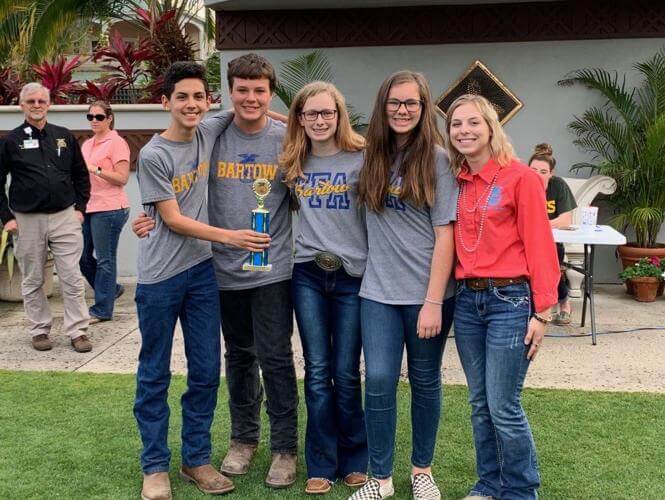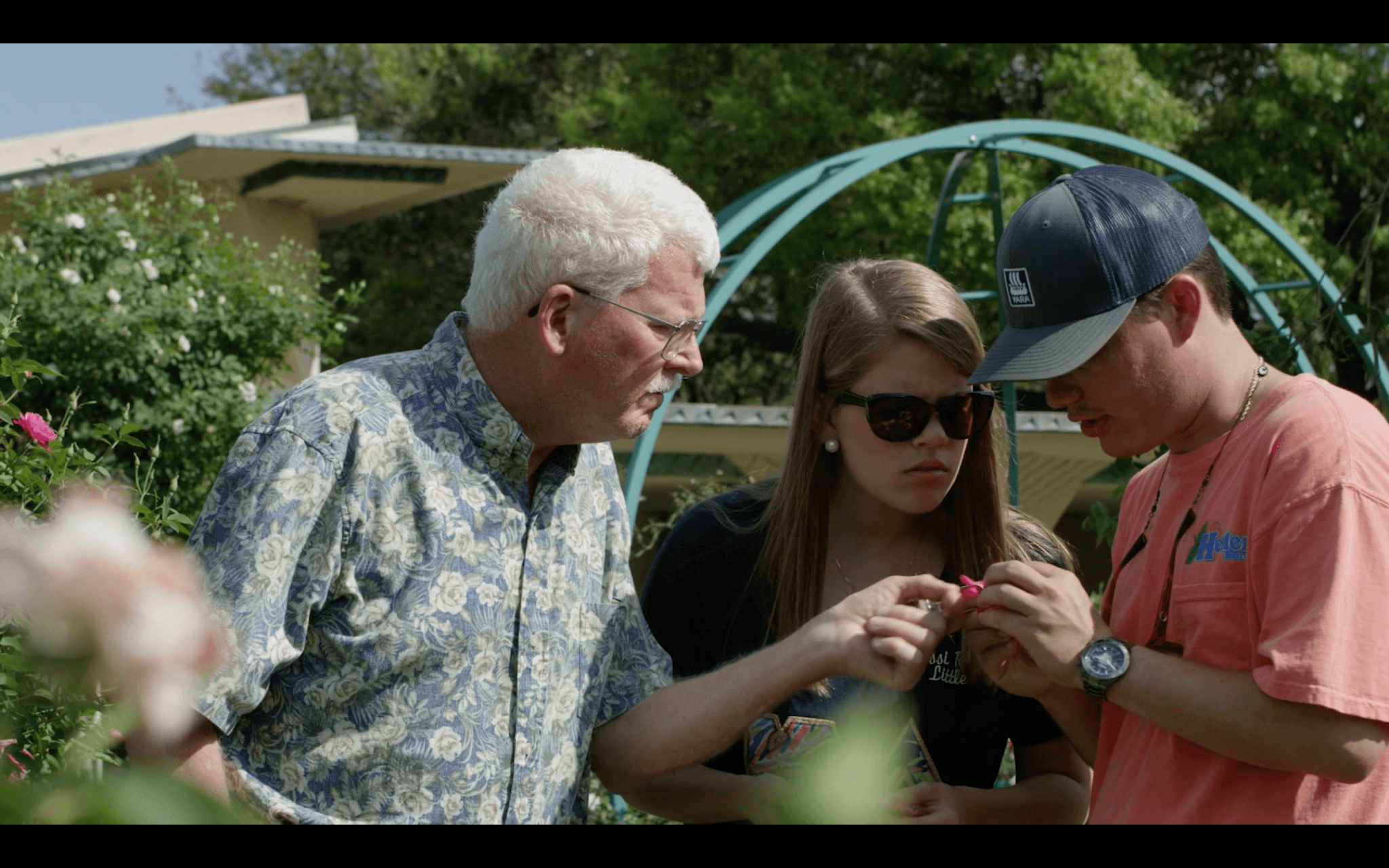Polk Schools Prepare Students for Jobs in the Agriculture Industry
As we approach National Agriculture Day on March 22, it’s important to recognize the educational institutions that help fuel the industry’s workforce. Polk County Public Schools and higher education institutions prepare students to work or pursue advanced degrees in this expanding field.
According to the Polk County Farm Bureau, 33% of jobs in the county are related to the agriculture industry. Additionally, 45% of land in Polk is used for agriculture purposes. These figures explain why all 15 of the county’s high schools have agriculture programs, as well as several middle schools that have agriculture pre-academies.
Winter Haven, Bartow and Kathleen high schools have some of the longest-running ag programs. According to Jessica Anderson of Polk County Public Schools, given the number of jobs in the industry, many students stay in Polk and begin working immediately after graduation. Anderson is the agriculture/Future Farmers of America specialist for the district.
Anderson said the goal of ag academies is to “prepare students to eventually join the workforce through instruction in skills, various industry pathways and professional networking. In addition to a well-prepared workforce, we want students to be well-informed consumers of available products and resources.”
“Citrus, row crops, forage crops and other forms of production agriculture were popular employment areas early on,” she said. “As agriculture has evolved with mechanization and industrialization, the industry has expanded to include a much more skilled and diverse workforce.”

Florida Southern College
Florida Southern College offers the nation’s only bachelor’s degree specifically in Citrus. The Citrus and Horticultural Science program offers concentrations in biotechnology, business, citrus and pre-graduate studies. Through small classes and hands-on experiences, students are provided with a solid foundation in biology, chemistry and crop production.
“They all contain the core of horticultural crop production, with a background in biology and chemistry, and then they concentrate on the appropriate area,” said Malcolm M. Manners, professor of citrus science. “Many of our students do at least two of the concentrations, with citrus/business and biotechnology/Pre-Grad Studies as the two most popular combinations.”
Students at Florida Southern learn in and outside the classroom, utilizing 8,500 square feet of greenhouse facilities to study and grow over 500 varieties of plants year-round. The Lakeland campus has a collection of citrus trees for use in hands-on engaged learning in classes. In addition, the college provides access to chemistry and genetics labs and comprehensive gardens.
Students also have access to a number of industry professionals. For example, because of the schools’ proximity to the Citrus Research and Education Center in Lake Alfred, students can learn from expert guest speakers from the industry. According to Manners, as companies diversify their crops, Florida Southern students will be ready for those changes.
Warner University Agriculture Studies
Hugh Moye, assistant professor of Agricultural Science at Warner University, says his school offers an all-encompassing Agriculture Studies degree.
“We teach the technical aspect of agriculture and the science behind it, but also provide students with hands-on experience,” Moye said. “They don’t just sit in the classroom all of the time. We get outside, we work in our greenhouse and our raised bed.”
According to Moye, students must take an ag mechanics course that covers topics such as woodworking, plumbing, electricity, and concrete.
“They are definitely getting their hands dirty in there as well. If anything breaks down on the farm, you have to be the first one to try to fix it. If you have a tractor that’s not working properly, John Deere will send a mechanic out, but it may be a couple of hours or a couple of days.”
Additionally, specialty crops, animal science, soils, plant science, conservation, sustainability, global agriculture, and agribusiness are among the other focus areas.

UF Citrus Research and Education Center
The University of Florida’s Institute of Food and Agricultural Sciences (UF/IFAS) is a federal-state-county partnership dedicated to developing knowledge in agriculture, human and natural resources, and the life sciences. UF/IFAS has Extension offices in each Florida County.
The UF/IFAS Citrus Research and Education Center in Lake Alfred is home to the Florida Department of Citrus. CREC is dedicated to uncovering innovation in the citrus and other agricultural industries. In addition, it’s home to the largest citrus library in the world. Faculty also offer graduate-level courses in person and via distance learning technology.

Technology and Agriculture
Furthermore, Anderson and More agree that schools must keep up with the latest technology, an important component in the industry today.
“Our equipment in the field (tractors, ATVs, etc.) use GPS to maintain efficient use of land space,” Anderson said. “We use sensors and digital monitors to sample soil and reduce fertilizer use and water consumption by targeting specific areas/plants, and we teach CAD (Computer-Aided Design) software to our agriculture mechanics students, who run CNC (Computer Numerical Control) machines to fabricate metal projects. The list could go on and on, but as the industry evolves, so must our education.”
Warner also keeps up on technology, Moye said.
“GPS gives us a better idea of the topography of the land,” he said. “We also use satellite imagery to help with spray rigs so you don’t spray pesticides near waterways. You can program it to turn off close to waterways or spray more or less based on soil type as you move across the field.”
Such equipment is costly upfront, but after 5 to 10 years of usage, farmers can save money by not over spraying, he said.
Ag and Economic Development
Moye said that the agricultural industry is second in the state behind tourism. “While you’re at Disney World, you’re going to eat something,” he said.
Ag is always going to be among the top few industries in any economy, he said. “People just don’t think about it. It’s timber, ornamental – people like flowers, horticulture. Every florist is in ag; that might not be their first thought, and you don’t think of it. Even some medicinal drugs – they found aspirin in a tree. That’s how Bayer started. Bayer is a huge company and they are more ag than people realize.”
“Agriculture is such an important part of Florida’s economy, particularly in the center of the state where we have several ag industries and a wealth of natural resources,” Anderson said. “There is a large demand for agriculture programs. Our communities see value in being informed consumers and producers of food and fiber crops. We are now training the next generation of agriculturists, scientists, fabricators, entrepreneurs and communicators within the ag industry.”
Furthermore, Anderson and Moye pointed out that the entire population consumes food and fiber products. “This industry is vital to our community and economy, which makes it important for our students to be exposed to agriculture,” Anderson said.
Advice to Students
Anderson has advice for ag students in public schools: “Many times the agriculture industry is considered to be a grassroots type of organization. Networking and connections with people not only provide opportunities to learn but also to grow in a career. Never underestimate an opportunity because it looks like hard work.”
Moye agrees, saying all students need to expose themselves to as many different types of courses as possible to figure out what they want to do after graduation. “They need to find out what they like best,” Moye said. At Warner, they can do that while taking three practicums, which require them to do 45 hours of hands-on work outside the classroom. “They can do a nursery and then a cattle ranch to get that experience.”
Afterward, they can hone their skills as part of an agricultural capstone, where they work 405 hours – basically a full-time job – during their last semester. “A couple companies have hired students from their practicum into jobs.”
Graduates are everywhere, working with anything we consume, Moye said. “Ag is the largest industry in the world. I like a good steak as much as the next guy, and I’m a plant guy. It starts with plants. Cows eat grain and grass. We’re never going to reach a point without ag.”
Manners said Florida Southern has a reputation for ensuring its ag graduates are successfully employed. “We have vast numbers of graduates at managerial levels in all aspects of Florida’s citrus and other agricultural industries. They are well-prepared for their successful, satisfying careers.”
Agriculture affects everything. “You can fit ag into any type of job description,” Moyes said. For instance, the logistics industry and truck drivers need to be able to move the supply chain from north to south, east to west, quickly. “You have to get product like fresh produce from one location to another. Amazon is good at moving a phone charger. Ag is more time sensitive. That food, as soon as you pick it from the field, it starts to degrade. So you have to get it from point A to B in the shortest time you can.”
Because of that, graduates with a degree in Ag Sciences can explore a multitude of careers:
- Education as an ag teacher at a high school.
- Chemical or seed sales.
- The food safety industry, which could even include inspecting produce in the field or orange juice manufacturing.
- Ag business or policy jobs.
“You can have any type of education or lack thereof,” Moye said, saying his grandfather had an eighth-grade education and he has a Ph.D., and both worked in agriculture. “There is a job for you at some point or another.”



